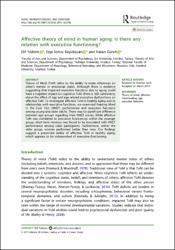| dc.contributor.author | Yıldırım, Elif | en_US |
| dc.contributor.author | Soncu Büyükişcan, Ezgi | en_US |
| dc.contributor.author | Gürvit, İbrahim Hakan | en_US |
| dc.date.accessioned | 2019-05-13T21:56:11Z | |
| dc.date.available | 2019-05-13T21:56:11Z | |
| dc.date.issued | 2019-04 | |
| dc.identifier.citation | Yıldırım, E., Soncu Büyükişcan, E. & Gürvit, İ. H. (2019). Affective theory of mind in human aging: Is there any relation with executive functioning? Neuropsychology, Development, and Cognition. Section B, Aging, Neuropsychology and Cognition, 27(2) 207-219. doi:10.1080/13825585.2019.1602706 | en_US |
| dc.identifier.issn | 1382-5585 | |
| dc.identifier.issn | 1744-4128 | |
| dc.identifier.uri | https://hdl.handle.net/11729/1592 | |
| dc.identifier.uri | http://dx.doi.org/10.1080/13825585.2019.1602706 | |
| dc.description.abstract | Theory of Mind (ToM) refers to the ability to make inferences on other’s mental or emotional states. Although there is evidence suggesting that impaired executive functions due to aging could have a negative impact on cognitive ToM, there is still controversy about the effect of age and age-related executive dysfunctions on affective ToM. To investigate affective ToM in healthy aging and its relationship with executive functions, we examined Reading Mind in the Eyes Test (RMET) performance and executive functions among young and older adults. There was no significant difference between age groups regarding their RMET scores. While affective ToM was correlated to executive functioning within the younger group, short term memory was found to be associated with RMET performance among older participants. Furthermore, within the older group, women performed better than men. Our findings suggest a preserved ability of affective ToM in healthy aging, which appears to be independent of executive functioning. | en_US |
| dc.language.iso | eng | en_US |
| dc.publisher | Routledge | en_US |
| dc.relation.isversionof | 10.1080/13825585.2019.1602706 | |
| dc.rights | info:eu-repo/semantics/closedAccess | en_US |
| dc.subject | Affective | en_US |
| dc.subject | Age | en_US |
| dc.subject | Executive functions | en_US |
| dc.subject | Mind-reading | en_US |
| dc.subject | Theory of mind | en_US |
| dc.subject | Aged | en_US |
| dc.subject | Article | en_US |
| dc.subject | Executive function | en_US |
| dc.subject | Eye | en_US |
| dc.subject | Female | en_US |
| dc.subject | Male | en_US |
| dc.subject | Groups by age | en_US |
| dc.subject | Healthy aging | en_US |
| dc.subject | Human | en_US |
| dc.subject | Human experiment | en_US |
| dc.subject | Short term memory | en_US |
| dc.subject | Task performance | en_US |
| dc.subject | Age-Related differences | en_US |
| dc.subject | Frontotemporal dementia | en_US |
| dc.subject | Social brain | en_US |
| dc.subject | Eyes test | en_US |
| dc.subject | Adults | en_US |
| dc.subject | Performance | en_US |
| dc.subject | Validation | en_US |
| dc.subject | Depression | en_US |
| dc.subject | Components | en_US |
| dc.subject | Deficits | en_US |
| dc.title | Affective theory of mind in human aging: is there any relation with executive functioning? | en_US |
| dc.type | article | en_US |
| dc.description.version | Publisher's Version | en_US |
| dc.relation.journal | Aging, Neuropsychology, and Cognition | en_US |
| dc.contributor.department | Işık Üniversitesi, Fen Edebiyat Fakültesi, Psikoloji Bölümü | en_US |
| dc.contributor.department | Işık University, Faculty of Arts and Sciences, Department of Psychology | en_US |
| dc.contributor.authorID | 0000-0003-3445-9197 | |
| dc.identifier.volume | 27 | |
| dc.identifier.issue | 2 | |
| dc.identifier.startpage | 207 | |
| dc.identifier.endpage | 219 | |
| dc.peerreviewed | Yes | en_US |
| dc.publicationstatus | Published | en_US |
| dc.relation.publicationcategory | Makale - Uluslararası Hakemli Dergi - Kurum Öğretim Elemanı | en_US |
| dc.contributor.institutionauthor | Yıldırım, Elif | en_US |
| dc.relation.index | WOS | en_US |
| dc.relation.index | Scopus | en_US |
| dc.relation.index | PubMed | en_US |
| dc.relation.index | Social Sciences Citation Index (SSCI) | en_US |
| dc.description.quality | Q3 | |
| dc.description.wosid | WOS:000465930000001 | |
| dc.description.pubmedid | PMID:30994403 | |


















